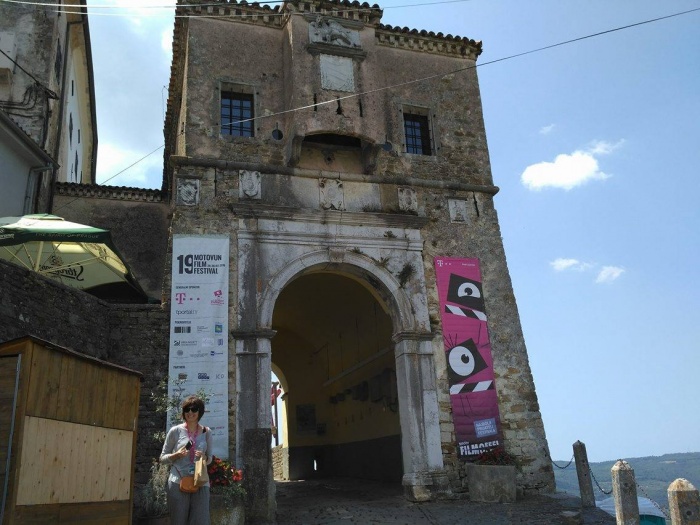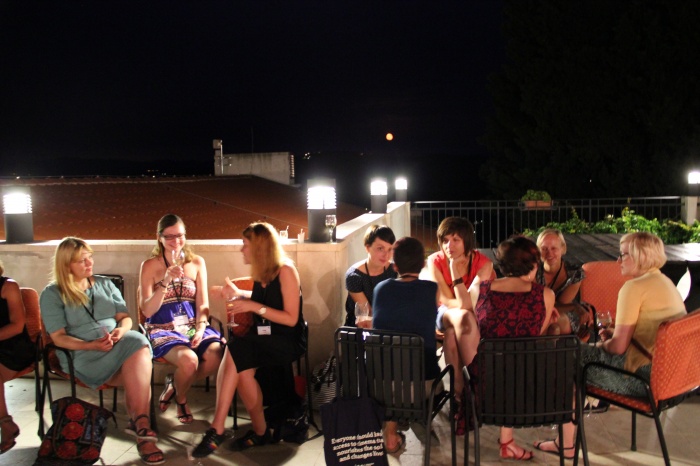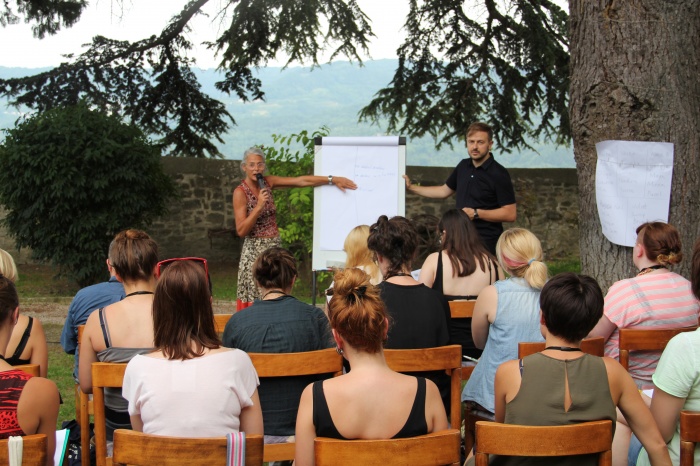
Develop your film festival traditionally takes place at the Croatian town of Motovun. These unique seminars share experinces of the world’s most famous film festivals like Berlinale, Rotterdam and Hot Docs with their participants.
People come here seeking advice, inspiration and everything that could help develop and upgrade a film festival in the future. "Developing your film festival"weekly workshop has taken place there for the sixth time this year and gathered festival workers from 16 countries. Thanks to the Creative Europe program Ukrainian festival has participated in this international “professional improvement course” for the firs time.
Olga Birzul and Victoria Leshchenko, Docudays UA program coordinators, tell why this education course is better than any “retreat”.
Tell us about the training: how it all happens and what is special about it?
Olga Birzul (O.B.): Developing your film festival is a training that takes place before Croatian Motovun Film Festival. It is famous mostly for its location. For the twelfth time the location has been a medieval mountain town of Motovun. It’s a cozy little village where time seems to be frozen. If it doesn’t seem so, local farmers who grow truffles, lavender and grapes will help you feel the “lightness of being”. The festival organizers bring all the supplies, like electric generators and furniture, with them every year. On our breaks we watched loaded tracktors with smiling young people slowly pass through the gates built in times of the Republic of Venice. Most screenings take place in the open air in the last week of July. There is no competition here, and the program is very diverse: fiction films, documentaries and animated films. For this year’s opening an eccentric film was chosen - Tangerine shot by Sean Baker on his iPhone 5s. The organizers said later that Motovun was specifically chosen for the workshop because international cultaral exchange and introduction of the exotic forms of film leisure are among it’s goals.

The gate near entrance to the town of Motovun
Victoria Leshchenko (V.L.): We saw the training on the Internet two years ago, and thanks to Ukrainian membership in the Creative Europe program that partly provides the finance support for this workshop we finally got the opportunity to participate. The founder of the seminars is a British organization, the Independent Cinema Office (ICO). Besides education it also occuppies itself with consulting, programming, distribution, and provides a service package to support and develop film distribution. Intensive education courses have been taking place in Croatia for experienced festival managers as well as for people who have just begun their way in the field. Basically there are series of lectures that allow to “upgrade” a film festival.

Participants of training, ICO (c)
There are many different film festivals in Europe. Was this diversity considered during the workshops?
O.B. That’s true. Serbian participants told us there were around 10 festivals per year in their country, and there is intense competition between them. To compare, Serbia is six times smaller than Ukraine. Of course the tutors of Developing your film festival help festivals underline their unique traits, and the participants actively discuss, for example, questions of inviting the audience, finding financial support and developement of an effective work mode inside the team. By the way, the tutors are heads of successful international film forums. ICO are actively inviting representatives of the festivals that have recently made their names because they want the participants to hear about the fresh “formula of success”. We have outlined a developement plan for ourselves. Our aim is to launch a full industrial program at Docudays UA. Documentary films are specific field, and we wolud like to help directors bring their projects into life. We are already taking steps in that direction: our festival has organized two projects with the British Council - DocWorks and The Guardian goes Ukraine.

Morning. Motovun Square, where open-air screenings will be organized
There are many interesting festivals in the world. For example, Romanian horror festival organized for fun by the Transilvania International Film Festival team. Another example is Otto Kylmälä, one of the tutors, director of the Finnish Loud Silents film festival. He makes something like Silent Nights festival in Odessa. But the Finns cooperate with the new curators each time. By the way, programmers (program coordinators) at many festivals are cooperating with the curators actively nowadays. Curator is more artist than administrator. He has creative freedom, finds new focus points for the festival content. Programmer is more like a capable manager and process organizer. We argued about the line between these jobs during his lecture though.

Chief editor Cineuropa Domenico La Porta reveals secret of communication with the press
V.L. To me programmer is a person who understands the needs of the audience, who programs the festival to “work”. There undoubtebly is an efficient and well-thought management apart from the program part. Marketologists, fundrisers, PR-managers, system administrators who organize the whole office work should also work at the festival. That is an important thing for the festival to function. Every training day was dedicated to a certain topic: strategic planning, sponsorship or work with volunteers. The first half of the day we listened to 2-3 tutor lectures, and after the lunch there was practical part.
What was the biggest impression for you during the course?
O.B. I liked the evening conversations when tutors shared their experience informally. Simple life stuff came up, important to the festival work. We talked a lot about keeping friendship in festival team and finding enthusiasm to work. These evening meetings added human energy and opened new friends. The festival in Motovun was an inspiration; it’s the second part of the training created as an annual festival for friends. Everything is very informal. During the opening viewers gather at the town’s central square, and the director approaches the stage (Igor Mirković, a Croatian film director) and introduces the two programmers. Then two rappers jump out of nowhere with their socially critical texts, and everyone sings with them holding a bottle of whine in a hand.

Evening gatherings, ICO (c)
V.L. That’s true! Motovun festival has a unique atmosphere! The biggest impresion for me was the day of commercial sponsorships, and it’s tutors. For example, we have listened to charizmatic and wonderful Dagmar Forelle. She worked as an assistant for Wim Wenders and met Dieter Kosslic, Berlin film festival director, who invited her to be the head of the festival department for commercial sponsorships, where she has been working successfully for the last 20 years. The amount of the commercial income has increased greatly since then. Among the latest main sponsors are L'Оreal Paris and Audi. They have become our practical task. The tutors pretended to be commercial representatives and we had to make an impressive 5-minute presentation of the chosen festival to get their financial support. Our team has decided to brand the mirrors at the festival locations with slogans about the universality of beauty. We have also suggested to launch a flashmob of making selfies in these mirrors using L'Оreal hashtag. We really were creating specific mechanisms to use in the future in our own festivals.

Workshop with Dagmar Forelle (Berlin International Film Festival) and Mindaugas Morkūnas (Vilnius International Film Festival, ICO (c)
What questions were the most popular among your colleagues?
O.B. By the way, before the training we were asked to write down the list of problems we wanted to work through in our festival. It turned out that the most common problem among our colleagues was finding budget.
V.L. Small festivals cannot get big grants, that’s why commercial sponsorship is a way of suvival for them. Despite the fact that Docudays UA is a human rights festival we also need to learn to cooperate with commercial sponsors. It’s just a specific work direction, but in time it could give us an opportunity to break even.

Working with colleagues in groups - part of the workshops, ICO (c)
What developement do you see for Docudays UA now, when you’ve compared experiences with your colleagues?
O.B. To tell the truth, it wasn’t a relief to feel that some of the offered improvement instruments simply wouldn’t work in our country. Economical and political circumstances are constantly creating obstacles, and the festival team has to find ways out by themselves.
V.L. I didn’t get that feeling. It’s all in the head! We should just change the accent! Of course Berlin film festival has different problems than us, but in all the strategies and negotiations it is important to realise and think through, where you can compromise.
O.B. Ok, I’ll explain. For example, there is an entrance fee at all the festivals - participants of the program. We’ve been exhaustively planning the implemention of the ticket system for a long time because we understood that in times of financial crisis and war in the country a person would think twice before paying for the ticket. Besides that, most of our colleagues from the training work at recreational festivals. A documentary-oriented event is specific. We constantly need to wake an interest in social problems in our audience. We cannot turn to most sponsors because of the ethical reasons: most Ukrainian corporations have bad reputation. Of course the reality changes, and as festival managers we need to look for new perspectives, develop an industrial program for the new good Ukrainian documentaries to appear, build cultural bridges between people, countries and festivals. And in this case the tips of ICO tutors are very useful for us.

The evening of opening Motovun Film Festival
V.L. Alan Black, one of the Hot Docs founders (and that is one of the world’s biggest documentary film festivals), said a very neat phrase. He’s been listening to us for a long time during the lecture, and then asked a very common question: “How do you see the developement of your festival?”. The collegues have mostly talked about growing of the budget, or of the audience, and of the festival itself. And he said a very simple thing: “When we started Hot Docs in 1993, there was only one cinema and a small group of like-minders. To tell the truth, 211 000 people visited the festival this year. We have organized a hundred and a half screenings in 15 cinemas. 600 volunteers have been working with us the whole time… Do you know what the biggest problem is? How to remain a small cozy festival with it’s own viewers when you’re so big!” Docudays UA is starting to have the same problem. You cannot resist the growing demand for films, and have to keep the standards high at the same time, and look for the individual approach to each and every viewer. Alan’s words are a good reminder that the festival is a personal property not only for you, but also for a viewer. When your viewer thinks of it as of his/her home full of friends, (s)he is ready to suport and defend it. I suspect that this formula is the key to success for many big film festivals.
Interview by Victoria Khomenko
Pictures of Olga Birzul and ICO